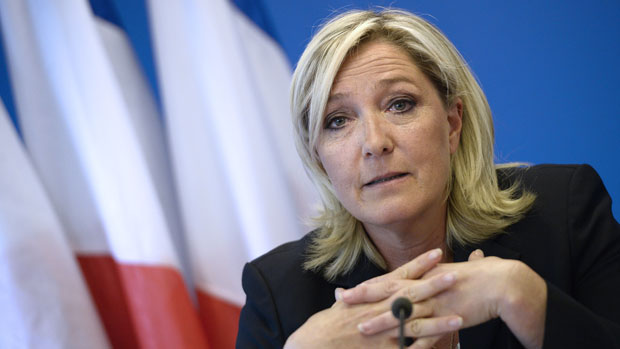Marine Le Pen's immunity lifted: What does it mean for the French elections?
European parliament takes vote on National Front leader's tweets of Islamic State violence

A free daily email with the biggest news stories of the day – and the best features from TheWeek.com
You are now subscribed
Your newsletter sign-up was successful
EU politicians have voted to lift French far-right leader Marine Le Pen's immunity so she can be prosecuted for tweeting gruesome images of Islamic State violence, including the beheading of a US journalist.
Members of the legal affairs committee voted by 18 to three in favour of the politician losing her immunity, saying of the images: "It is beyond question that their violent nature is likely to undermine human dignity. Their publication therefore warrants the opening of criminal proceedings."
The decision was confirmed by the European parliament yesterday, following a request from a French prosecutor. Le Pen could face three years in jail if she is charged and found guilty.
The Week
Escape your echo chamber. Get the facts behind the news, plus analysis from multiple perspectives.

Sign up for The Week's Free Newsletters
From our morning news briefing to a weekly Good News Newsletter, get the best of The Week delivered directly to your inbox.
From our morning news briefing to a weekly Good News Newsletter, get the best of The Week delivered directly to your inbox.
"Le Pen may calculate that this is an issue that will do her no harm with hard-right supporters of her party, the Front National," says the BBC's Kevin Connolly.
This is not the first time she has lost her diplomatic immunity, which is given to MEPs to ensure free speech. She previously lost her parliamentary privilege in 2013, over comments she made about Muslims. She was prosecuted in 2015 with "incitement to discrimination over people's religious beliefs", for comparing Muslims praying in public to the Nazi occupation of France during World War II, Reuters reports. "Prosecutors eventually recommended the charges be dropped."
The latest controversy follows a separate scandal surrounding Le Pen's alleged misuse of EU funds. She "has been asked to pay back more than $320,000 [£260,000] to the European parliament because two of her aides in Brussels were actually working for her campaign in France", NPR reports. "She has denied any wrongdoing."
What did the tweets contain?
A free daily email with the biggest news stories of the day – and the best features from TheWeek.com
In late 2014, Le Pen posted a series of vitriolic tweets that included photographs of killings by IS, writing: "Daesh [IS's Arabic name] is THIS!" The posts drew revulsion and criticism from bereaved families and French politicians across the political spectrum.
She defended the posts by saying she had merely wanted to condemn the barbaric practices of the terror group.
"I'm a lawmaker. I'm in my role when I condemn Daesh. This is my role," she told French TV station LCP. "If I don't fulfill my role, I'm worth nothing as a lawmaker.
"Nobody can prevent a representative of the Republic from condemning Daesh's acts of violence."
France 24 says Le Pen "has so far refused to attend a police interview over the investigation… citing her status as a member of the European parliament".
Will she be prosecuted?
It is unclear whether prosecutors will take legal action before this year's presidential elections, which will be held in two rounds in April and May.
Under French law, the maximum penalty for distributing violent images is three years in prison and a fine of up to €75,000 (£64,000).
-
 What to know before filing your own taxes for the first time
What to know before filing your own taxes for the first timethe explainer Tackle this financial milestone with confidence
-
 The biggest box office flops of the 21st century
The biggest box office flops of the 21st centuryin depth Unnecessary remakes and turgid, expensive CGI-fests highlight this list of these most notorious box-office losers
-
 The 10 most infamous abductions in modern history
The 10 most infamous abductions in modern historyin depth The taking of Savannah Guthrie’s mother, Nancy, is the latest in a long string of high-profile kidnappings
-
 Epstein files topple law CEO, roil UK government
Epstein files topple law CEO, roil UK governmentSpeed Read Peter Mandelson, Britain’s former ambassador to the US, is caught up in the scandal
-
 Iran and US prepare to meet after skirmishes
Iran and US prepare to meet after skirmishesSpeed Read The incident comes amid heightened tensions in the Middle East
-
 Israel retrieves final hostage’s body from Gaza
Israel retrieves final hostage’s body from GazaSpeed Read The 24-year-old police officer was killed during the initial Hamas attack
-
 China’s Xi targets top general in growing purge
China’s Xi targets top general in growing purgeSpeed Read Zhang Youxia is being investigated over ‘grave violations’ of the law
-
 Panama and Canada are negotiating over a crucial copper mine
Panama and Canada are negotiating over a crucial copper mineIn the Spotlight Panama is set to make a final decision on the mine this summer
-
 Why Greenland’s natural resources are nearly impossible to mine
Why Greenland’s natural resources are nearly impossible to mineThe Explainer The country’s natural landscape makes the task extremely difficult
-
 Iran cuts internet as protests escalate
Iran cuts internet as protests escalateSpeed Reada Government buildings across the country have been set on fire
-
 US nabs ‘shadow’ tanker claimed by Russia
US nabs ‘shadow’ tanker claimed by RussiaSpeed Read The ship was one of two vessels seized by the US military